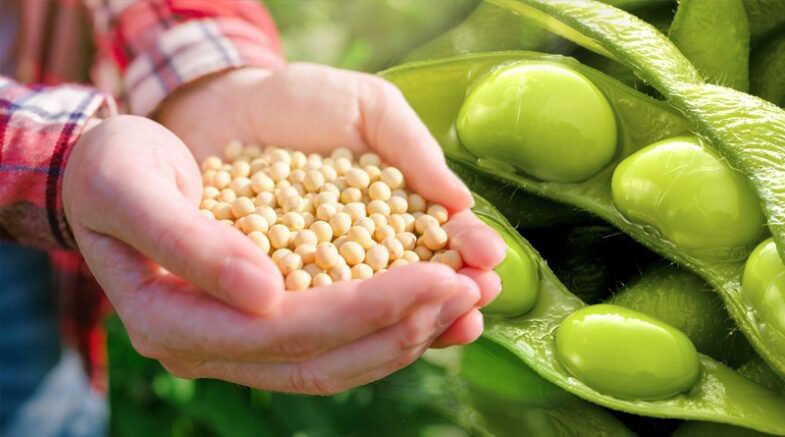Soybean is a complete protein, meaning it contains all of the essential amino acids required for human nutrition.

Soybean is a highly nutritious legume that is native to East Asia and is widely cultivated for its edible beans. It is a staple food in many countries, particularly in Asia, and is used in various forms, including tofu, soy milk, and soy protein. The popularity of soybean is due to its rich nutritional value and numerous health benefits.
Soybeans are a highly nutritious food that provides numerous health benefits. They are a good source of protein, fiber, and healthy fats, as well as vitamins and minerals such as iron, calcium, and B vitamins.
Additionally, soybeans contain phytochemicals, including isoflavones, which have been shown to have a number of health benefits, including reducing the risk of heart disease and certain types of cancer, improving bone health, and alleviating menopausal symptoms.
One of the primary nutritional benefits of soybean is its high protein content. Soybean is a complete protein, meaning it contains all of the essential amino acids required for human nutrition. It is also low in fat and contains no cholesterol, making it a healthy alternative to animal-based proteins.
Soybean, highly nutritious legume is also a good source of vitamins and minerals, including vitamin K, folate, iron, and calcium. Vitamin K is important for maintaining healthy bones, while folate is crucial for healthy cell growth and DNA synthesis. Iron helps to transport oxygen in the blood, and calcium is essential for strong bones and teeth.
In addition to its nutritional value, soybean also has numerous health benefits. It has been shown to lower cholesterol levels, reduce the risk of heart disease, and help prevent certain types of cancers, such as breast, prostate, and colon cancer.
Soybean, highly nutritious legume is also a rich source of antioxidants, which help to protect the body against free radical damage and reduce the risk of chronic diseases.
Soybean is also a good source of phytoestrogens, which are plant-based compounds that have a similar structure to estrogen, a hormone produced by the body. Phytoestrogens have been shown to help regulate hormone levels, particularly in postmenopausal women, and reduce the risk of certain types of cancers and heart disease.
It is important to note that some people may be allergic to soybean, so it is always best to consult a doctor before incorporating soybean products into your diet. Additionally, soybean is often genetically modified, so it is important to choose organic soybean products to avoid consuming genetically modified organisms (GMOs).
Nutritional profile of soybean
Soybean is a highly nutritious food that offers a wide range of nutrients. The following is a sum mary of its nutritional profile:
Protein: Soybean is a complete protein, meaning it contains all of the essential amino acids required for human nutrition. It is also low in fat and contains no cholesterol, making it a healthy alternative to animal-based proteins.
Vitamins: Soybean is a good source of vitamins, including vitamin K, folate, and riboflavin. Vitamin K is important for maintaining healthy bones, while folate is crucial for healthy cell growth and DNA synthesis. Riboflavin helps to convert food into energy.
Minerals: Soybean is also a good source of minerals, including iron, calcium, and magnesium.
Iron helps to transport oxygen in the blood, while calcium is essential for strong bones and teeth. Magnesium helps to regulate heart rate and blood pressure.
Fiber: Soybean is a good source of fiber, which helps to promote digestive health and regulate bowel movements.
Fat: Soybean, highly nutritious legume is low in fat and contains no cholesterol, making it a healthy alternative to animal based proteins.
In addition to its nutritional value, soybean is also a rich source of antioxidants and phytoestrogens, which have numerous health benefits. It is important to choose organic soybean products to avoid consuming genetically modified organisms (GMOs).
Soybean health benefits
High in Protein: Soybeans are an excellent source of high-quality protein, containing all nine essential amino acids. One cup of soybeans contains 28 grams of protein, making it a great option for vegans and vegetarians.
Heart-Healthy: Soybeans contain compounds called isoflavones, which have been shown to help lower cholesterol levels and improve heart health. This can reduce the risk of heart disease and stroke.
Promotes Bone Health: Soybeans are high in calcium and magnesium, which are essential minerals for strong bones. Regular consumption of soybeans can help maintain strong bones and reduce the risk of osteoporosis.
Boosts Immune System: Soybeans are high in antioxidants, which help protect the body from damage from free radicals and boost the immune system.
Helps with Weight Management: Soybeans are low in calories and high in fiber, which makes them a great option for weight management. The fiber content helps keep you feeling full for longer periods of time, reducing the need to snack on unhealthy foods.
Conclusion
Soybean is a highly nutritious and versatile food that offers numerous health benefits. Its high protein content, vitamin and mineral content, and phytoestrogens make it a healthy and nutritious food that can be incorporated into a balanced diet. Just be sure to choose organic products to avoid GMOs and always consult with a doctor if you have any health concerns.
